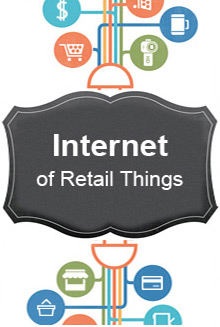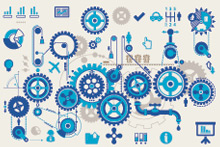Manufacturing methods, as is the case with any other industry sector, are constantly undergoing change and modernisation to keep pace and get ahead of the competition and to meet the demands of customers. Downtimes and quality standards have become so sharp and narrow that innovation is a necessity.
A paradigm jump in the manufacturing world was initiated in 2011 by the German Government to promote and revolutionize the computerization of manufacturing. The working group on Industry 4.0 as the concept was called submitted its final report in April 2013 at the Hannover Fair. Industry 4.0 signifies the fourth revolution in production, following mechanisation using steam and water, the use of electric power and the digital revolution.
Industry 4.0 is basically a concept wherein the advances in Information Technology are harnessed to modernize manufacturing methods and make them more efficient and quality oriented. Basically, the need to improve and digitize manufacturing arises due to the following factors:
- Increase in data volumes
- The need of analysis of data
- The need to streamline machine-human interactions
- Possibility of using innovations in Information Technology in manufacturing
There are four categories of use cases where an up-gradation to Industry 4.0 can be viewed:
Smarter Enterprise Control
o Scope: Integration of machines and manufacturing assets with PLC to enable IT+OT integration.
o Method: Integration of following silos:
Production Systems (sensors, actuators, control systems, MES, ERP)
PLM, SCM, CRM
o Use Cases:
Mass customization and lot sizes of one
Modification of production plan / recipes based on the spot price of raw materials
Asset Performance Management
o Scope: There could be two different scopes based on the actors:
Enterprise: Improve asset performance
Manufacturer: Provide “Product as a Service”
o Method: Wireless sensors, connectivity, and data analytics
o Use Cases:
Condition Monitoring: Condition based monitoring and predictive maintenance.
Remote Monitoring
Indoor Asset Tracking
o Scope: Design and development of Indoor-positioning solution for various assets/people to be tracked on a factory floor
o Method: Tags attached to various assets/people in the plant can be tracked with help of beacon-based indoor positioning technology
o Use Cases:
Monitoring asset usage
Reducing time lost in locating specific moving assets
Augmented Operators
o Scope: Design and supply tools that can help operators/technicians in Management or MRO process
o Method: Mobile HMI such as smartphones are connected to all the system – Production Systems (sensors, actuators, control systems, MES, ERP)
o Use Cases:
Online Access of the SOP manual of various parts
Voice and NLP based dashboards
Many companies are choosing one use case over the other based on what would give immediate ROI to them. This requires technologies to enable connectivity, analytics, and visualization to allow them to create an impact. The right choice of technology solution becomes a key consideration.
Let us examine how these concepts actually help manufacturing.
The flexibility provided by innovation and interaction among the various systems result is shorter cycle times and, when necessary, the possibility of making complex products. The vagaries of market demands can be met with the flexibility of operation and the possibility of changing product slates. Quality requirements that go with these innovations make the products more acceptable to the demanding consumer.
That these revolutionary concepts mean a real transformation in manufacturing is given and accepted. However, for these to succeed and bear fruit, it is necessary for all elements in the chain and network to cooperate and contribute. These elements may be internal departments and external agencies like suppliers and vendors. Also necessary is proper conceptualization, defining workflow and objective planning.
Most of the concepts covered by Industry 4.0 are in use in individual systems. What the industry has been doing thus far is to fine tune and improve its systems to be in competition. However, Industry 4.0 seeks to harmonize and optimize systems and processes to achieve a quantum jump in competitiveness and productivity.

Manu Tayal is a General Manager spearheading the IoT/M2M solutions and service offerings. He comes with a rich experience of 16 years in the IT industry. Within M2M/IoT his focus is on servicing product companies build the right solutions, right from devices to cloud to mobile enabled applications. His role involves technology direction, business development and capability building.
Manu holds a Bachelor’s degree from IIT Roorkee in Electronics and Communications. You can reach him at [email protected].





